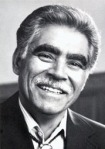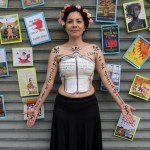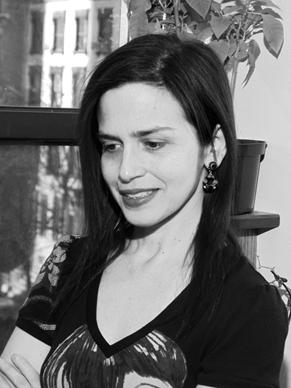On July 4, 1776, the United States of America declared themselves free from Great Britain. Thanks to its diverse population, the United States is one of the world’s great superpowers. And, by 2050, some scholars project it will boast the largest Spanish-speaking population in the world. Here’s a look, by region, at some of America’s great Latino writers.
 California: Luiz Valdez, right, the father of Latino theater and playwright of “Zoot Suit,” began presenting plays during the Delano farmworkers strike. The plight of farmworkers in California have been the subject of books by Helena María Viramontes and Pam Muñoz Ryan. Other Californians include Gustavo Arellano, Margarita Engle, Alex Espinoza, Reyna Grande, Gilbert Hernandez, Lorraine López, Luis J. Rodriguez, Michele Serros, Gary Soto, Héctor Tobar and Victor Villaseñor.
California: Luiz Valdez, right, the father of Latino theater and playwright of “Zoot Suit,” began presenting plays during the Delano farmworkers strike. The plight of farmworkers in California have been the subject of books by Helena María Viramontes and Pam Muñoz Ryan. Other Californians include Gustavo Arellano, Margarita Engle, Alex Espinoza, Reyna Grande, Gilbert Hernandez, Lorraine López, Luis J. Rodriguez, Michele Serros, Gary Soto, Héctor Tobar and Victor Villaseñor.
 New Mexico: Native son Rudolfo Anaya, left, considered the father of Chicano literature, has set his novels, including his beloved Bless Me Ultima and Sonny Baca mysteries, in this state. The state also served as the setting for novels by Ana Castillo, Denise Chávez and Alisa Valdes.
New Mexico: Native son Rudolfo Anaya, left, considered the father of Chicano literature, has set his novels, including his beloved Bless Me Ultima and Sonny Baca mysteries, in this state. The state also served as the setting for novels by Ana Castillo, Denise Chávez and Alisa Valdes.
 Puerto Rico: The Caribbean island joined the United States in 1898. Esmeralda Santiago, right, wrote about her personal history in When I Was Puerto Rican and the island’s history in the novel Conquistadora. Other authors of Puerto Rican heritage include Lyn DiIorio, Sarah McCoy, Piri Thomas, Justin Torres and Willliam Carlos Williams.
Puerto Rico: The Caribbean island joined the United States in 1898. Esmeralda Santiago, right, wrote about her personal history in When I Was Puerto Rican and the island’s history in the novel Conquistadora. Other authors of Puerto Rican heritage include Lyn DiIorio, Sarah McCoy, Piri Thomas, Justin Torres and Willliam Carlos Williams.
 Texas: Life on the border has served as fodder for books by Rolando Hinojosa, left, of the Rio Grande Valley, and Sergio Troncoso of El Paso. Sandra Cisneros, originally from Chicago, set her books Woman Hollering Creek and Have You Seen Marie? in this state. Other Tejanos include Dagoberto Gilb, Manuel Gonzales, Diana López and Gwendolyn Zepeda.
Texas: Life on the border has served as fodder for books by Rolando Hinojosa, left, of the Rio Grande Valley, and Sergio Troncoso of El Paso. Sandra Cisneros, originally from Chicago, set her books Woman Hollering Creek and Have You Seen Marie? in this state. Other Tejanos include Dagoberto Gilb, Manuel Gonzales, Diana López and Gwendolyn Zepeda.
 The country’s most prestigious literary award, the Pulitzer Prize, has been given to Cuban-American Oscar Hijuelos and Dominican-American Junot Díaz, right, in the fiction category; Cuban-American Nilo Cruz and Quiara Alegría Hudes, who is of Puerto Rican descent, in drama; and numerous journalists. Eduardo Lalo won the 2013 International Rómulo Gallegos Prize for Fiction, becoming the first American to win one of Latin America’s most prestigious literary awards. The Pura Belpré Award, given by the American Library Association, honors books written for young readers.
The country’s most prestigious literary award, the Pulitzer Prize, has been given to Cuban-American Oscar Hijuelos and Dominican-American Junot Díaz, right, in the fiction category; Cuban-American Nilo Cruz and Quiara Alegría Hudes, who is of Puerto Rican descent, in drama; and numerous journalists. Eduardo Lalo won the 2013 International Rómulo Gallegos Prize for Fiction, becoming the first American to win one of Latin America’s most prestigious literary awards. The Pura Belpré Award, given by the American Library Association, honors books written for young readers.








































